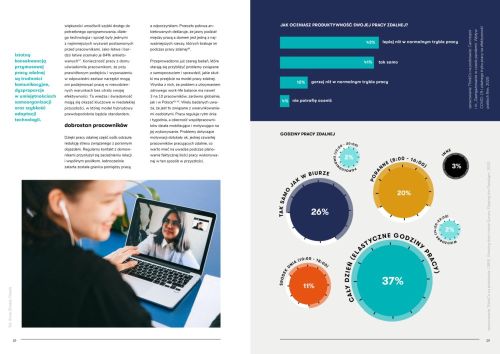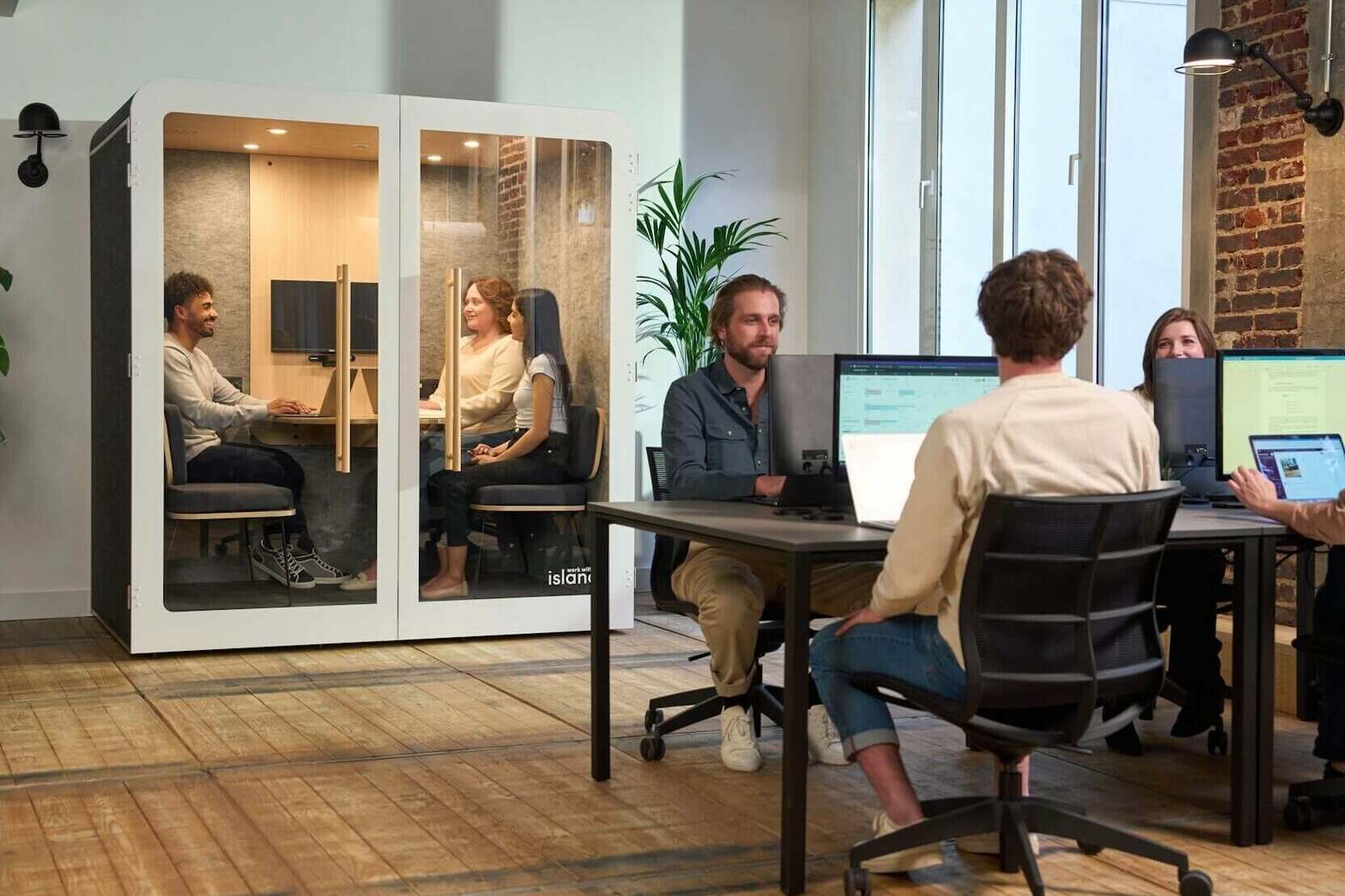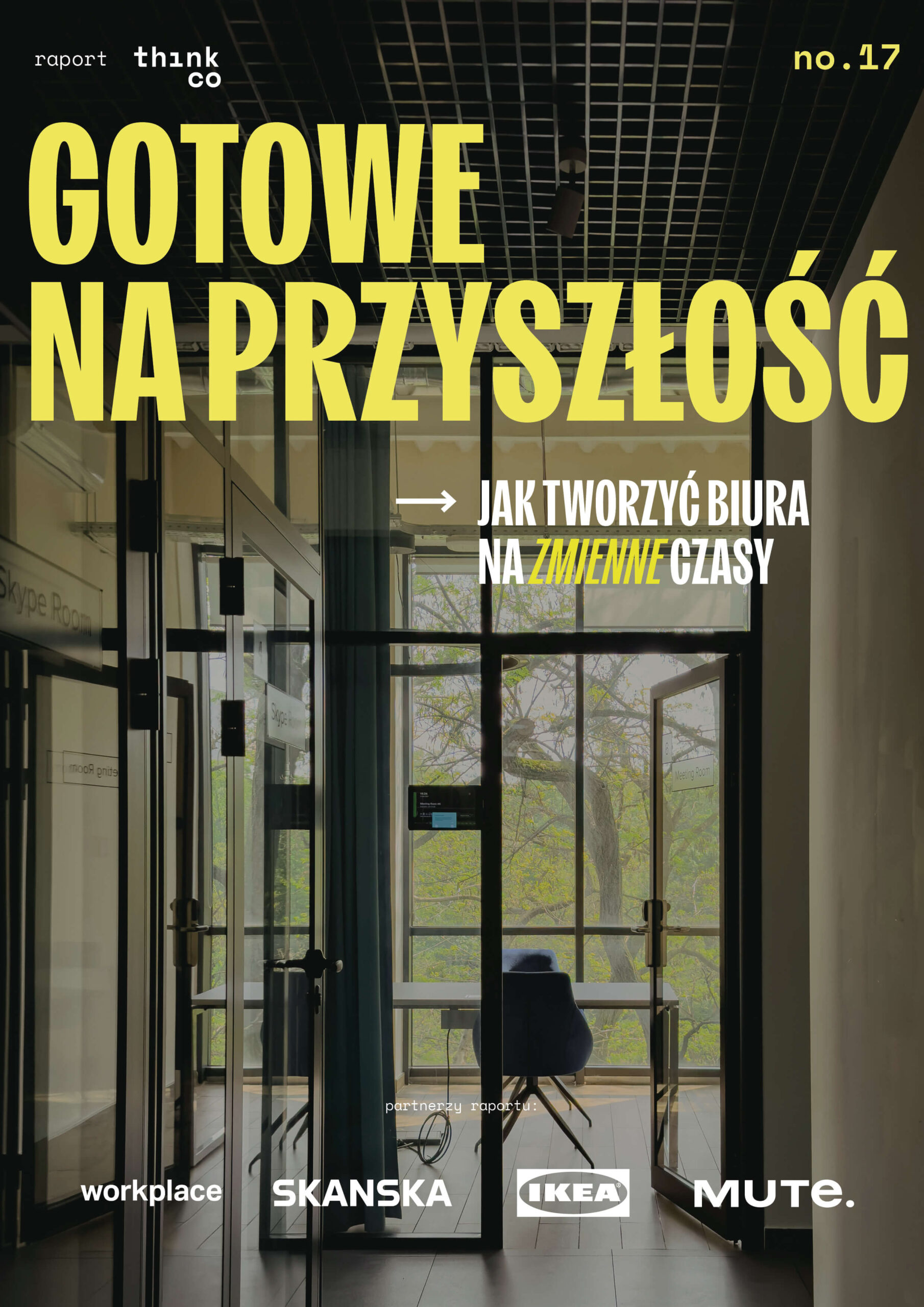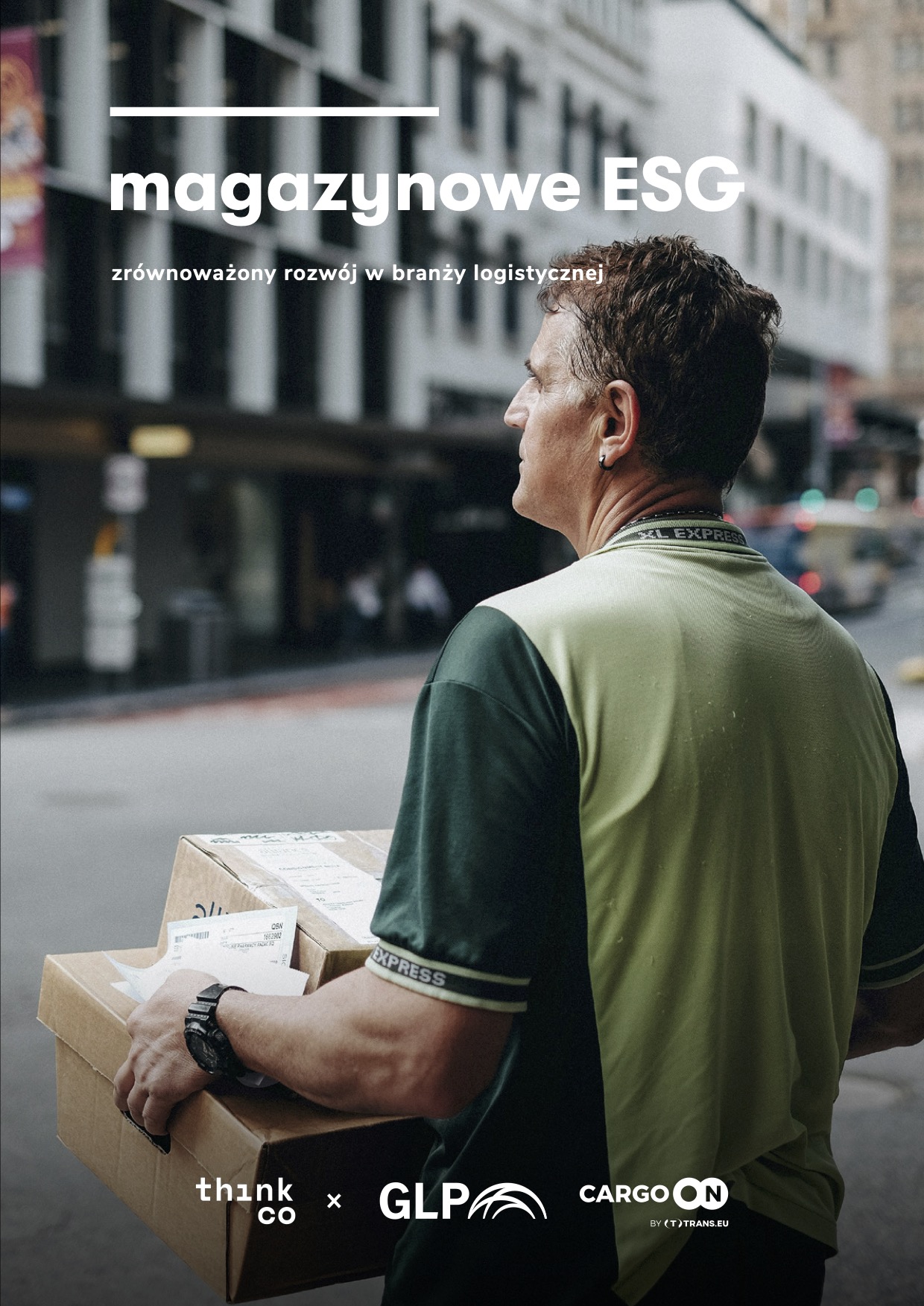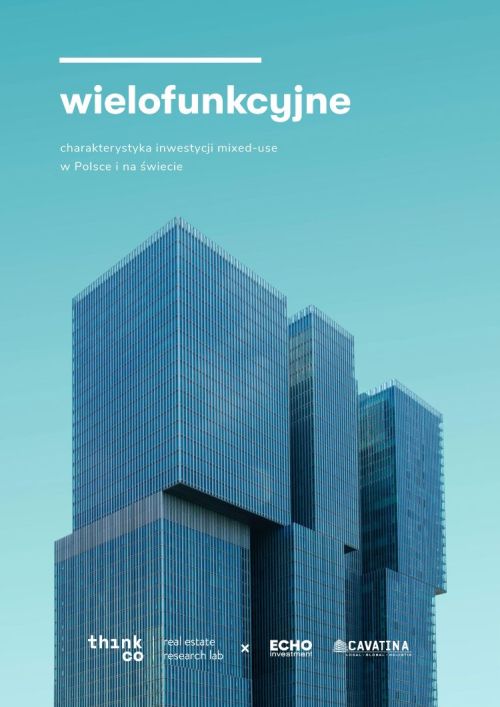In the spring of 2020, millions of employees switched to remote work. This has caused quite a stir in the office market and has raised numerous questions about how would it change the way we work. A year later, we already know that the key to understanding the future of offices is to understand the behavior and needs of their users. Here you will find our newest report, "Offices in the New Normal. How Workplaces Are Adapting to a Post-Pandemic World".
"Offices in the New Normal" is an attempt to answer the question of how the pandemic changes both the work culture and office market. We already know that this is not a revolution, but only an accelerated evolution. The pandemic and the popularity of remote work became the catalysts for changes that had already started earlier.
The report summarizes the most important trends present in the office market before the pandemic. We indicate which of them will permanently fit into the world of work. However, the office sector is facing rapid changes, also caused by other social, environmental and technological factors. We look at them carefully and draw potential scenarios for the future.
Offices are not going anywhere
For decades, offices have evolved along with the needs of their users. Thanks to this, they remain a comfortable and ergonomic place to work, despite some disadvantages. This is confirmed by the data collected in "Offices in the New Normal". The major problem of working from home is the poor housing conditions of many Poles - as many as 40% of us live in overcrowded dwellings. Paradoxically, what we miss the most about offices is the people - 64% of employees working remotely indicate that they lack conversations with colleagues. It is the social aspect that remains the greatest asset of offices. On the one hand, the office provides a place for establishing business relations, assuming the role of the organization's showroom. On the other hand, it is a place where teams integrate and the organizational culture is developed.
Flexibility is the key
The popularity of remote work dispelled doubts about the effectiveness of working outside the office and time management. Today we know that remote work in most cases does not have a negative impact on productivity. On the contrary, 43% of respondents say they are more productive outside the office, and another 41% don't see the difference. The most frequently mentioned challenge related to flexible work is the change of traditional organizational culture and the uncertainty of its future shape. Companies also face concerns about the lack of sufficient workplace privacy, and thus the protection of data and sensitive information. Technological issues are also important - equipping employees with appropriate mobile equipment and ensuring a stable internet connection.
New rules on the market
In the coming years, we expect little activity from tenants, and at the same time a significant volume of new space will be put into use. In addition, a further reduction in space requirements is expected due to the advancing automation. We can therefore talk about the tenant market: office operators will be forced to attract customers with the best price-quality ratio. In addition to the rearrangement of offices and sanitary safety measures, their expectations evolve towards the well-being of employees. During the transition period - both in terms of the market situation and work culture - companies expect the greatest possible flexibility. This applies in particular to the duration of signed contracts, often shortened to three years with the possibility of renegotiation and early exit. At the same time, rising popularity of flexible and coworking spaces is expected.
Wellbeing
Over 90% of companies introduce elements of broadly understood wellbeing for their employees. It translates into an increase in efficiency and a decrease in rotation. The architecture itself plays an important role - spaces for quiet work or relaxation rooms, but also green roofs and terraces, natural light, greenery in the office and good ventilation. The Covid-19 pandemic has added to this list the issues of health, sanitation, and the balance between work and private life. Especially for the Generation Z, emerging on the labor market, it is particularly important to remember about mental wellbeing and to support the community that is co-created by office users. In order to keep up with the needs of employees, it is necessary to listen to their voices.
What's next?
The conversation about the impact of the pandemic on the office market and the way we work is extremely multifaceted, it is no different with the forecasts for the future. What if we don't contain the virus and the pandemic will stay with us for years, profoundly changing the global economy? How will the real estate market, including offices, react to radical attempts to slow down climate change? Does remote work have a chance to give new life to small towns and regional cities? In "Offices in the New Normal" , we answer these and other questions by developing scenarios based on knowledge drawn from a wide range of fields.
In partnership with:

In the spring of 2020, millions of employees switched to remote work. This has caused quite a stir in the office market and has raised numerous questions about how would it change the way we work. A year later, we already know that the key to understanding the future of offices is to understand the behavior and needs of their users. Here you will find our newest report, "Offices in the New Normal. How Workplaces Are Adapting to a Post-Pandemic World".

"Offices in the New Normal" is an attempt to answer the question of how the pandemic changes both the work culture and office market. We already know that this is not a revolution, but only an accelerated evolution. The pandemic and the popularity of remote work became the catalysts for changes that had already started earlier.
The report summarizes the most important trends present in the office market before the pandemic. We indicate which of them will permanently fit into the world of work. However, the office sector is facing rapid changes, also caused by other social, environmental and technological factors. We look at them carefully and draw potential scenarios for the future.
Offices are not going anywhere
For decades, offices have evolved along with the needs of their users. Thanks to this, they remain a comfortable and ergonomic place to work, despite some disadvantages. This is confirmed by the data collected in "Offices adter COVID". The major problem of working from home is the poor housing conditions of many Poles - as many as 40% of us live in overcrowded dwellings. Paradoxically, what we miss the most about offices is the people - 64% of employees working remotely indicate that they lack conversations with colleagues. It is the social aspect that remains the greatest asset of offices. On the one hand, the office provides a place for establishing business relations, assuming the role of the organization's showroom. On the other hand, it is a place where teams integrate and the organizational culture is developed.
Flexibility is the key
The popularity of remote work dispelled doubts about the effectiveness of working outside the office and time management. Today we know that remote work in most cases does not have a negative impact on productivity. On the contrary, 43% of respondents say they are more productive outside the office, and another 41% don't see the difference. The most frequently mentioned challenge related to flexible work is the change of traditional organizational culture and the uncertainty of its future shape. Companies also face concerns about the lack of sufficient workplace privacy, and thus the protection of data and sensitive information. Technological issues are also important - equipping employees with appropriate mobile equipment and ensuring a stable internet connection.
New rules on the market
In the coming years, we expect little activity from tenants, and at the same time a significant volume of new space will be put into use. In addition, a further reduction in space requirements is expected due to the advancing automation. We can therefore talk about the tenant market: office operators will be forced to attract customers with the best price-quality ratio. In addition to the rearrangement of offices and sanitary safety measures, their expectations evolve towards the well-being of employees. During the transition period - both in terms of the market situation and work culture - companies expect the greatest possible flexibility. This applies in particular to the duration of signed contracts, often shortened to three years with the possibility of renegotiation and early exit. At the same time, rising popularity of flexible and coworking spaces is expected.
Wellbeing
Over 90% of companies introduce elements of broadly understood wellbeing for their employees. It translates into an increase in efficiency and a decrease in rotation. The architecture itself plays an important role - spaces for quiet work or relaxation rooms, but also green roofs and terraces, natural light, greenery in the office and good ventilation. The Covid-19 pandemic has added to this list the issues of health, sanitation, and the balance between work and private life. Especially for the Generation Z, emerging on the labor market, it is particularly important to remember about mental wellbeing and to support the community that is co-created by office users. In order to keep up with the needs of employees, it is necessary to listen to their voices.
What's next?
The conversation about the impact of the pandemic on the office market and the way we work is extremely multifaceted, it is no different with the forecasts for the future. What if we don't contain the virus and the pandemic will stay with us for years, profoundly changing the global economy? How will the real estate market, including offices, react to radical attempts to slow down climate change? Does remote work have a chance to give new life to small towns and regional cities? In "Offices after COVID" , we answer these and other questions by developing scenarios based on knowledge drawn from a wide range of fields.
In partnership with:


WORKSHOPS: Offices in the New Normal
The workshop focuses on the analysis of the office market development prospects in the context of your business. The program includes:
- Conclusions of the report
- Brainstorm on the development prospects of the office market in the context of the client's business
- For real estate development companies: discussing the investment from the perspective of changing market situation
- For tenants of office space: analysis of the company's strategy and the demand for office space in the context of ongoing changes.
The workshop will result in a thorough knowledge of the development prospects of the office market and, depending on the nature of the client's business:
- Initial analysis of the strategy of specific investments and translating the conclusions of the report into the client's needs
- Summary of the needs from the tenant's perspective and key guidelines for the workplace strategy
ThinkCo
We are the first advisory company in Poland specializing in new ideas for real estate. We combine the knowledge of researchers and architects with business world experience, creating innovative processes, products, and services for the real estate market.
We focus on interdisciplinarity. Our specialists come from various environments and represent different experiences, constantly expanding the range of our capabilities and knowledge. The role of ThinkCo is to use this knowledge as an opinion maker in the process of implementation of new solutions on the real estate market.















